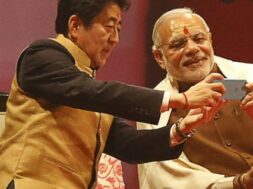
India-friendly ex-Japanese PM Shinzo Abe assassinated; New Delhi declares mourning on Saturday
Virendra Pandit
New Delhi: Former Japanese Prime Minister Shinzo Abe, 67, was assassinated on Friday during an election campaign in Nara city in western Japan.
The ghastly incident occurred at about 11.30 AM (8.30 AM IST).
The longest-serving, India-friendly former Japanese PM was shot at twice and collapsed on a street in Nara City as several security guards ran towards him, the media reported.
In 2021, India decorated him with the second-highest civilian award, the Padma Vibhushan, for his sterling contribution to upgrading bilateral relations.
Prime Minister Narendra Modi, who had a personal bond with Abe, expressed shock and profound grief over the untimely demise of his friend. “As a mark of our deepest respect for former Prime Minister Abe Shinzo, a one-day national mourning shall be observed on 9 July 2022,” he tweeted.
“I am shocked and saddened beyond words at the tragic demise of one of my dearest friends, Shinzo Abe. He was a towering global statesman, an outstanding leader, and a remarkable administrator. He dedicated his life to making Japan and the world a better place,” Modi said.
According to the media reports, the Nara fire department had earlier said the ex-PM was in cardiopulmonary arrest before they took him to the hospital. They said that he had been wounded on the right side of the neck and the left clavicle. Abe’s wife, Akie, also rushed to the hospital.
Police arrested a man Tetsuya Yamagami, 41, said to be a resident of Nara City, on suspicion of attempted murder for shooting at Abe. He is reportedly a former member of the maritime self-defense force and may have shot at Abe from behind with a homemade gun. The motive for the attack is yet to be confirmed.
Japan’s longest-serving post-Second World War PM, Abe (21 September 1954–8 July 2022) occupied the top post from 2006 to 2007 and then for eight years between 2012 and 2020. He resigned in August 2020, citing health concerns. Yoshihide Suga, his fellow Liberal Democratic Party leader, succeeded him but was soon replaced by Fumio Kishida.
Even after his resignation, however, Abe remained a central figure in Japan’s LDP, where he controlled one of its dominant factions.
During his time in office, Abe left an indelible mark on the country’s foreign and economic policies — strengthening ties with Japan’s allies abroad and attempting to revitalize the Japanese economy with his trademark ‘Abenomics’ policies.
Abe came from a political family. His grandfather Nobusuke Kishi was Japan’s PM (1957-60), while his father Shintaro Abe was a foreign minister (1982-86).
Abe had a tumultuous tenure, mired by political controversy and worsening relations with neighbor South Korea. However, he survived it all.
His economic policies, which helped him get re-elected in 2012, and his hardline stance on Japan’s revisionist history had led to many observers describing him as a right-wing nationalist leader.
One of his more-controversial goals was revising Article 9 of the Constitution, which stipulates that “the Japanese people forever renounce war as a sovereign right of the nation”. They added the article to the then newly minted Japanese Constitution following the end of the Second World War. At the behest of the US, a clause in the constitution forbade the country from maintaining an army, navy, or air force.
He did, however, send troops to fight overseas for the first time since the Second World War. They also credited him with strengthening the country’s military by bolstering defense spending.
In his two terms as the PM, Abe sought to upgrade the strategic Japan–India relationship. He started the Quadrilateral Security Dialogue (QUAD) between Japan, the United States, Australia, and India in 2007. His three-day visit to India in August 2007 inaugurated a new bilateral Asian alliance, building on the long history of friendly bilateral relations between the two countries.













